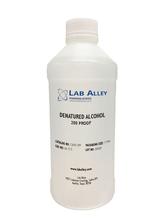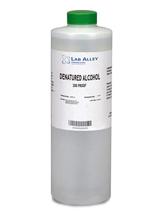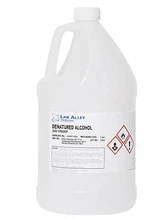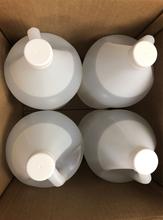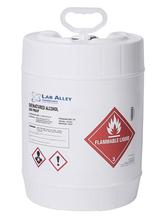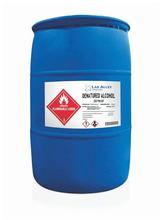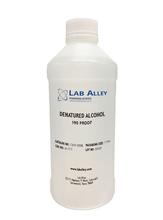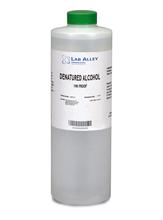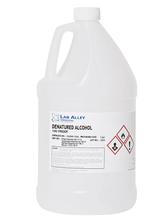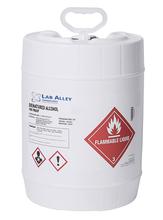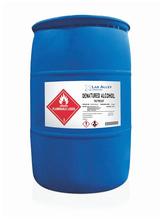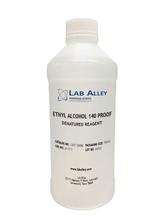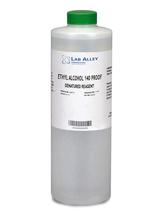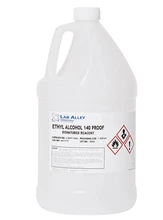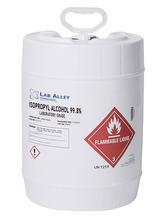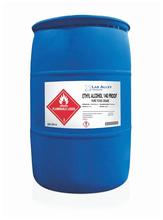Where To Buy Denatured Alcohol | Antiviral Ingredient For Sanitation | Disinfectants, Sprays, Wipes & Cleaners | Denatured Ethanol | 100%, 95%, 70% Alcohol | 200, 190, 140 Proof
100% Denatured Alcohol (200 Proof Ethanol) For Sale Online
95% Denatured Alcohol (190 Proof Ethanol) For Sale Online
70% Denatured Alcohol (140 Proof Ethanol) For Sale Online
Buy Denatured Alcohol (Ethanol/ Formula C2H5OH) Online Here Or By Phone: 512-668-9918
If you have questions about ordering antiviral denatured alcohol or laboratory supplies online here at LabAlley.com or would like to place an order, call 512-668-9918 or email customerservice@laballey.com to talk with a Denatured Alcohol Specialist. Buy virus disinfectants here.
If you are wondering, denatured alcohol and denatured alcohol fuel are the same thing. Denatured alcohol sold at LabAlley.com is used as a cleaner, disinfectant and as a fuel for camp stoves and alcohol burners. Lab Alley sells high proof alcohol (200, 190 & 140 Proof Ethanol) in small and bulk size quantities.
Video: Where to Buy Isopropyl Alcohol in Bulk Online
Posted On YouTube.com On January 12, 2021 By Lab Alley (LabAlley.com)
Buy Ethanol Denatured With Methanol, Hexane Or Heptane At LabAlley.com
There are multiple methods of denaturing ethanol. Denatured ethanol that is used as a solvent, fuel, glass cleaner or disinfectant normally contains about 5% methanol. The most popular type of denatured ethanol ordered online at LabAlley.com contains 70-99% ethyl alcohol and is denatured with at least 5% methanol.
LabAlley.com also stocks alcohol denatured with hexane and heptane. Denatured ethanol is similar to methylated spirits. Methylated spirit is methanol mixed with ethanol. It has small amounts of other chemical additives and a purple dye.
Because denatured ethyl alcohol is unfit for human consumption, it is exempt from U.S. federal alcohol excise taxes for approved end-uses. Methanol, also known as methyl alcohol, is a highly flammable chemical with the formula CH₃OH. Methanol has a boiling point similar to ethanol. LabAlley.com also stocks pure methanol, pure hexane and pure heptane at LabAlley.com.
Use Ethanol To Make Antiviral Disinfectants
- Buy A 16 oz (500ml) Bottle Of 70% Denatured Alcohol
- Buy A 33 oz (1 Liter) Bottle Of 70% Denatured Alcohol
- Buy A 4 Liter (1 Gallon) Bottle Of 70% Denatured Alcohol
- Buy A 4x1 Gallon Case Of 70% Denatured Alcohol
- Buy A 5 Gallon Pail Of 70% Denatured Alcohol
- Buy A 55 Gallon Drum Of 70% Denatured Alcohol For (Federal Alcohol Excise Tax Included In Price)
Denatured Alcohol 55 Gallon Drums For Sale Online
- Buy A Drum Of Alcohol | 55 Gallon Drum | 100% Denatured
- Buy Denatured Ethanol In Bulk | 55 Gallon Drum
- Buy Denatured Ethanol In Bulk | 55 Gallon Drum | 100% (200 Proof)
- Buy Denatured Alcohol Disinfectant | 55 Gallon Drum
- 100% Denatured Alcohol | 55 Gallon Drum | Antiviral Disinfectant
- Buy 95% Denatured Alcohol | 55 Gallon Drum | Antiviral Disinfectant
- Buy 95% Denatured Alcohol | 55 Gallon | Antiviral Uses
- Buy 70% Denatured Alcohol | 55 Gallon | Antiviral Uses
How To Make A 70% Alcohol (Ethanol) Solution
Bulk Denatured Alcohol (Ethanol) For Sale
- 70% Denatured Alcohol 1 Pint (500ml)
- 95% Denatured Alcohol 1 Pint (16 oz)
- 100% Denatured Alcohol 1 Pint (16 oz)
- 70% Denatured Alcohol 1 Liter (33 oz)
- 95% Denatured Alcohol 1 Liter (33 oz)
- 100% Denatured Alcohol 1 Liter (33 oz)
- 100% Denatured Alcohol 1 Gal
- 95% Denatured Alcohol 1 Gal
- 70% Denatured Alcohol 1 Gal
- 70% Denatured Alcohol 5 Gal
- 95% Denatured Alcohol 5 Gal
- 100% Denatured Alcohol 5 Gal
- Standard 95% Denatured Alcohol 4x1 Gallon Case
- Standard 100% Denatured Alcohol 4x1 Gallon Case
- Standard 70% Denatured Alcohol 4x1 Gallon Case
- Ethanol Denatured With Heptane 1 Gallon
- Ethanol Denatured With Heptane 4x1 Gal Case
- Ethanol Denatured With Heptane 5 Gal
- Lab Alley Is A Denatured Alcohol Supplier, Distributor, Retailer And Wholesaler
- USA Bulk Denatured Alcohol Supplier
- Denatured Ethanol Bulk 270 Gallon Tote
- 95% Denatured Ethanol 55 Gallons
- 100% Denatured Ethanol 55 Gallons
- Bulk Ethanol
- Bulk Organic Alcohol 55 Gallons
- Bulk Organic Ethanol 55 Gallons
- 100% Denatured Ethanol 5 Gallon
- 100% Denatured Alcohol 5 Gallon
- Alcohol Denatured With Heptane
- Ethanol Denatured With Heptane
- Ethanol Denatured With Hexane
- Ethanol Denatured With Heptane 55 Gallon Drum
- Ethanol Denatured With Methanol
- Organic Denatured Alcohol
- Bulk Ethyl Alcohol For Sale
- Buy Ethyl Alcohol
- Isopropyl Alcohol
- Isopropyl Alcohol Bulk
- Bulk Ethanol Suppliers
- Denatured Alcohol Bulk
- Ethyl Alcohol Suppliers
- Denatured Ethanol Wholesale
- Bulk Ethyl Alcohol For Sale
- 200 Proof Ethanol
- 190 Proof Ethanol
- 140 Proof Ethanol
- 70% Isopropyl Alcohol
- 91% Isopropyl Alcohol
- 99% Isopropyl Alcohol
- Antiviral Denatured Alcohol
- Denatured Alcohol Cleaner
- Denatured Alcohol Disinfectant
- Denatured Alcohol For Virus Protection
- Denatured Alcohol Ingredients For Disinfectants, Sprays, Wipes And Cleaners
- 95% Denatured Alcohol
- 100% Denatured Alcohol
- 70% Denatured Alcohol
Learn About Denatured Alcohol With Audiopedia
Audiopedia is free service on YouTube.com that is targeted to blind and visually-impaired internet users that helps them learn from Wikipedia.
70% antibacterial and antifungal denatured alcohol and ethanol sold online at LabAlley.com are great virucidal disinfectants against non-enveloped viruses as well as single-stranded, positive-sense RNA viruses .
Ethanol and isopropyl alcohol are used throughout the world for disinfecting environmental surfaces in health care communities and for hand disinfection and hand rubbing. It has been noted that ethanol has a stronger and broader virucidal activity than propanol's such as isopropanol.
Non-enveloped viruses do not have a lipid-bilayer membrane. Non-enveloped viruses reproduce by breaching the membrane of a target host cell to get access to cytoplasm of the cell. A virus encased within a lipid bilayer is called an enveloped virus and a virus that does not have a bilayer is classified as a non-enveloped virus.
Due to the virus outbreak, U.S. businesses and consumers order EPA recommended disinfectants in bulk at LabAlley.com for cleaning and disinfecting and to kill germs on surfaces in households and community facilities.
The 70% ethyl alcohol sold by LabAlley.com is a better virucide than the 70% isopropyl alcohol and is quickly antimicrobial against viruses, bacteria and fungi on hard surfaces.
Isopropanol (isopropyl alcohol ) and ethyl alcohol in aqueous solutions between 60% and 90% alcohol with 10% to 40% purified water, kill bacteria and viruses by denaturing their proteins and dissolving their lipid membranes. When a bacterial cell is exposed to a solution of ethyl alcohol or isopropyl alcohol, the amphiphile alcohol molecules bond with the molecules of the bacteria's cell membrane, making it more soluble in water. This reaction causes the cell membrane to lose its structural integrity and then fall apart.
- Download Ethanol Safety Data Sheets (SDS/MSDS) Here
- Buy Ethanol Online At LabAlley.com/Collections/Ethanol
- Ethanol Density: 789 kg/m³
- Ethanol Formula: C2H5OH
- Ethanol Solubility: Soluble In Water, Hexane, Chloroform, Water, Hexane, Diethyl Ether, Ethyl Acetate, Sodium Hydroxide (NaOH), Kerosene, Gasoline (Petrol), Carbon Tetrachloride (Tetrachloromethane/CCl4) And Heptane
- Solvent Miscibility Table
- Ethanol Miscibility: Completely Miscible
- Ethanol Structure: AKA Ethyl Alcohol, Abbreviated As EtOH, Ethanol Has One Methyl (-CH3) Group, One Methylene (-CH2-) Group And One Hydroxyl (-OH) Group
- Ethanol Boiling Point: 173.1°F (78.37°C)
- Ethanol Melting Point: -173.5°F (-114.1°C)
- Ethanol CAS Registry Number: 64-17-5
- Molar Mass: 46.07 g/mol
- Boiling Point: 173.1°F (78.37°C)
- IUPAC ID: Ethanol
- Ethanol ChemSpider ID: 682
- Ethanol PubChem CID: 702
- Ethanol Chemical Formula: C2H5OH | Can Be Written As CH3CH2OH
- Pka: Ethanol's pKa Value Is About 15.9
- Wikipedia Description Of Ethanol: Ethanol is a chemical compound and a simple alcohol. It is a volatile, flammable, colorless liquid with a slight characteristic odor.
- PubChem Description Of Ethanol: Ethanol is a clear, colorless liquid rapidly absorbed from the gastrointestinal tract and distributed throughout the body. It has bactericidal activity and is used often as a topical disinfectant. It is widely used as a solvent and preservative in pharmaceutical preparations as well as serving as the primary ingredient in alcoholic beverages. Indeed, ethanol has widespread use as a solvent of substances intended for human contact or consumption, including scents, flavorings, colorings, and medicines.
Ethanol And Alcohol Uses
- Ethanol Is Used For Cleaning
- Ethanol Is Used For Drinking
- Ethanol Is Used For Botanical Extraction
- Ethanol Is Used For Sterilization
- Ethanol Is Used As A Solvent To Manufacture Varnishes
- Ethanol Is Used As A Solvent To Manufacture Perfumes
- Ethanol Is A Preservative For Biological Specimens
- Ethanol Is Used To Prepare Essences And Flavorings
- Ethanol Is Used To Treat Methanol Poisoning
- Ethanol Is Used For Fuel And Gasoline Additive
- Ethanol Is Used As A Disinfectant
- Ethanol (Ethyl Alcohol) Is Used As A Principal Ingredient To Make Alcoholic Beverages, Beer, Wine, Brandy And Liquor
- Ethanol Is Used For DNA Extraction
- Ethanol Is Used To Dissolve Aspirin
- Ethanol Is Used In Many Medicines And Drugs
- Ethanol Is Used For Agriculture
- Ethanol Is Used In Tinctures Such As Iodine
Is Rubbing Alcohol And Denatured Alcohol The Same Thing?
Rubbing alcohol is a generic term and is usually manufactured with isopropyl alcohol. Denatured alcohol contains ethanol and is engineered to discourage recreational human consumption by including additives that are poisonous, bad tasting, bad smelling or nauseating. Read more here.
Denatured Ethyl Alcohol For Sale In The U.S.
What is denatured alcohol or ethanol? The denatured alcohol formula is C2H5OH. It is also called methylated spirit or denatured rectified spirit. Some types of 200 proof alcohol are denatured IPA (Isopropyl Alcohol) and NP Acetate (n-Propyl Acetate). Rubbing alcohol is a type of denatured alcohol. Denatured alcohol is ethanol (grain alcohol) with methanol added. It is called denatured because a poison has been added to the drinkable ethanol for tax reasons. Isopropyl alcohol, also called rubbing alcohol, is not a drinkable alcohol. You can buy denatured ethyl alcohol in the United States online from Lab Alley without an ethyl alcohol permit or a specially denatured alcohol permit, which are basically the same thing. The CAS Registry Number (CASRN or CAS Number) assigned by the Chemical Abstracts Service (CAS) to ethanol is 64-17-5. To request the denatured ethanol MSDS (Material Safety Data Sheet) or SDS (Safety Data Sheet), click here. Buy Klean-Strip Denatured Alcohol At Lowe's here.
Denatured alcohol is ethanol (ethyl alcohol) made unfit for human consumption by adding one or more chemicals (denaturants) to it. Denaturing refers to removing a property from the alcohol (being able to drink it), not to chemically altering or decomposing it, so denatured alcohol contains ordinary ethyl alcohol. Read more here.
Technically, ethanol is not the same as denatured alcohol (methylated spirits). Although the main ingredient in denatured alcohol is ethanol, denatured alcohol is a blend of ethanol and toxic additives that prevent people from drinking it. This type of ethyl alcohol is called denatured alcohol because the natural qualities have been altered to make it unfit for drinking. Normally, the primary additive is methanol, so terms such as "methylated spirits" and "industrial methylated spirits" are used to describe denatured alcohol/ethanol. Other standard additives include Isopropyl Alcohol (IPA)/2-Propanol, Ethyl Acetate, N-Propyl Acetate, Methyl Ethyl Ketone, Acetone and Methyl Isobutyl Ketone. Ethanol is synthesized through the mechanism of hydration of ethylene or produced by fermentation.
It is prepared from a special denatured alcohol solution and contains approximately 70 percent by volume of pure, concentrated ethanol (ethyl alcohol) or isopropyl alcohol (isopropanol). Individual manufacturers can use their own "formulation standards" in which the ethanol content usually ranges from 70-99% v/v. Read more here.
Is Denatured Alcohol Illegal In California?
The State of California has joined a couple other states and Canada in banning Denatured Alcohol this year. It is no longer available in any hardware store, big box or woodworking supply houses. Read more here.
Alternatives To Denatured Alcohol
The only difference between denatured alcohol and Ethanol is the denatured has additives in it to make it non-potable. Read more here. Get information on non-toxic substitutes for denatured alcohol here.
Information On Uses Of Denatured Alcohol From Wikipedia
In many countries, sales of alcoholic beverages are heavily taxed for revenue and public health policy purposes (see Pigovian tax). In order to avoid paying beverage taxes on alcohol that is not meant to be consumed, the alcohol must be "denatured", or treated with added chemicals to make it unpalatable. Its composition is tightly defined by government regulations in countries that tax alcoholic beverages. Denatured alcohol is used identically to ethanol itself except for applications that involve fuel, surgical and laboratory stock. Pure ethanol is required for food and beverage applications and certain chemical reactions where the denaturant would interfere. In molecular biology, denatured ethanol cannot be used for the precipitation of nucleic acids. Denatured alcohol has no advantages for any purpose over normal ethanol; it is a public policy compromise. As denatured alcohol is sold without the often heavy taxes on alcohol suitable for consumption, it is a cheaper solution for most uses that do not involve drinking. If pure ethanol were made cheaply available for fuel, solvents, or medicinal purposes, it would be used as a drink by some people. Read more here.
More Information On Denatured Alcohol Uses
Denatured alcohol serves as a cleaning agent, fuel additive, sanding aid, exterminator, and as a solvent. Typical applications of denatured alcohols include:
- Window Cleaning
- Fueling of Small Camping Stoves
- Removal of Ink Stains
- Pharmaceutical Uses
- Pest Extermination
- Woodworking
- Paint Removal
- Read more here
Alcohol and Tobacco Tax and Trade Bureau (TTB) Phone Numbers | Ethyl Alcohol and SDA Permits | Nonbeverage Drawback Alcohol/Pure Alcohol | Contact Info
If you have questions about industrial alcohol regulations, call the Regulations and Rulings Division of the Alcohol And Tobacco Tax and Trade Bureau in Washington, DC at 202-453-2265. If you have questions about non-beverage drawback alcohol formulas and specially denatured alcohol, contact the Scientific Services Division in Ammendale, MD at 240-264-1594. Nonbeverage drawback alcohol is pure alcohol, the same as that used for consumption. However, when a manufacturer uses that alcohol in the production of a food, flavor, medicine or perfume that is approved by the Nonbeverage Products Laboratory as unfit for beverage purposes, he or she can claim a return on most of the distilled spirits excise tax paid. Click here for more contact information.
Specially Denatured Alcohol (SDA) Information From Nonbeverage Products Laboratory
SDA is alcohol to which denaturing materials have been added. Title 27 Code of Federal Regulations part 21 lists all the SDA formulas authorized by TTB. Manufacturers may use SDA in the manufacture of any product that is not intended for consumption. Generally, SDA is used in cosmetic products but its use extends to pharmaceuticals, chemical manufacturing, and products where SDA is the solvent or reactant.
Process for Using SDA
- Obtain a permit from the National Revenue Center to purchase SDA from a distilled spirits plant.
- Complete a formula application, TTB Form 5150.19, Formula and/or Process for Article Made with Specially Denatured Spirits.
Submit completed form to:
Alcohol and Tobacco Tax and Trade Bureau
Nonbeverage Products Laboratory
6000 Ammendale Road
Beltsville, MD 20705-1250
- Approval process takes approximately three weeks.
- The formula must be approved prior to manufacture.
- Direct any technical questions to 240-264-1588.
Denatured Alcohol Percentages
Lab Alley sells 100% denatured ethanol, 95% denatured alcohol and 70% denatured ethyl alcohol. You can buy ethanol that is not 100% alcohol. 190 proof (95% alcohol and 5% water) undenatured ethanol is blended with only water and this type of blend is classified as pure ethanol because it does not have poisons added to it. We do not suggest buying denatured ethyl alcohol at Walmart, Home Depot, on Amazon or at a pharmacy. Click here for denatured alcohol regulations in the United States published by the Alcohol and Tobacco Tax and Trade Bureau.
You do not have to pay excise tax on denatured alcohol. Denatured ethanol products do not require the payment of a Federal Excise Tax. You can buy tax free denatured alcohol from Lab Alley in the United States. Tax-free alcohol is non-denatured alcohol used for non-beverage purposes in scientific research and medicinal uses by educational organizations, hospitals, laboratories, etc. The use of alcohol free of tax is regulated to prevent illegal diversion to taxable beverage use. If you want to obtain an ethyl alcohol permit or download the application for an industrial alcohol user permit from the TTB, click here. For more information on denatured alcohol tax, the Alcohol and Tobacco Tax and Trade Bureau, TTB tax, TBB liquor and the excise tax on ethanol, click here.
Where You Buy Specially Denatured Alcohol (SDA) Ethanol
A type of ethanol classified as SDA is a specially denatured alcohol. Specially Denatured Alcohol (SDA) is alcohol to which denaturing materials have been added. Ethanol SDA is one of many types of denatured alcohol specified under the US Code of Federal Regulations. To read the TTB's overview of Specially Denatured and Completely Denatured alcohol including links, laws, regulations, and other formal public guidance, click here. Commonly used SDA ethyl alcohols include SDA 1-1, SDA 1-2, SDA 2B-2, SDA 2B-3, SDA 3A, SDA 3C, SDA 23A, SDA 23H, SDA 29-3, SDA 30, SDA 35A, SDA 39C and SDA 40B. The CAS Number is 64-17-5. Manufacturers may use SDA in the manufacture of any product that is not intended for consumption. Often "SDA" versions of ethanol are used in cosmetic products but can also be used in chemical manufacturing, pharmaceuticals, and solvents. The use of denatured non-beverage suitable alcohol in the United States avoids excise taxes on alcohol. Order 200 Proof Specially Denatured Alcohol Here >
Shipping and Transportation Of Denatured Ethanol In The USA
Some chemicals are classified as "Hazardous Materials" or "Hazmat". A hazardous material is any item or agent (biological, chemical, radiological, and/or physical), which has the potential to cause harm to humans, animals, or the environment, either by itself or through interaction with other factors.
The transportation of denatured ethanol purchased from Lab Alley requires special shipping by our common carrier FedEx. By law, hazmat fees will be added to your order for all hazardous chemicals and related laboratory products. Hazmat chemicals and related laboratory products can only be shipped via Ground and not Air (2nd day, Overnight, etc.). Ethanol is a hazardous material. For denatured ethanol shipping and transportation regulations in the United States, click here. Bulk ethanol is shipped in the USA by trucks, trains and boats.
To Read UPS' Guide For Transporting Hazardous Materials, click here. To read the USDOT Hazardous Materials Table 49CFR 172.101, click here. To Read the Electronic Code of Federal Regulations document titled "Table of Hazardous Materials and Special Provisions", click here.



